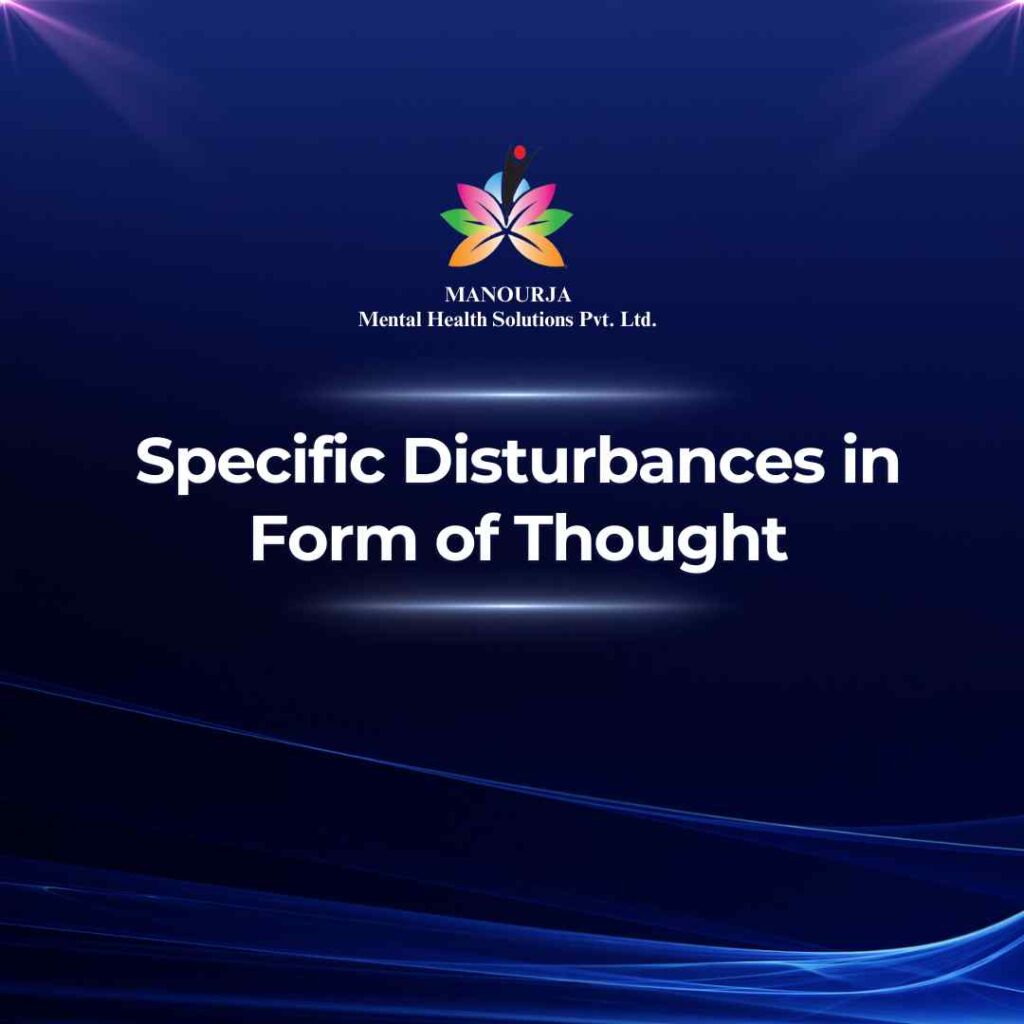Specific Disturbances in Form of Thought

“Specific disturbances in form of thought” refer to various disruptions in the way a person organizes and expresses their thoughts. These disturbances affect the coherence, flow, and logical structure of thoughts rather than the content itself. People experiencing these disturbances may have difficulty communicating clearly, organizing their thoughts logically, or maintaining a coherent train of thought.
Specific Disturbances in Form of Thought as a Sign and Symptom of Mental Illness
These disturbances are significant indicators of underlying mental health issues and can manifest in several ways, including:
- Tangentiality: The person goes off on tangents, moving from one topic to another, without returning to the original point.
- Circumstantiality: The person includes excessive and unnecessary details before arriving at the main point.
- Flight of Ideas: Rapidly shifting from one idea to another, making it difficult to follow the train of thought.
- Loose Associations: Thoughts are loosely connected, making the conversation seem disjointed or illogical.
- Thought Blocking: Sudden interruption in the flow of thought, leading to pauses or gaps in conversation.
- Perseveration: Repeating the same words or ideas persistently, regardless of the topic.
- Clang Associations: Words are chosen based on their sound rather than their meaning, often resulting in rhyming or punning.
- Neologisms: Creating new words or phrases that are not understood by others.
Mental Illnesses with Specific Disturbances in Form of Thought as Symptoms
These thought disturbances are commonly associated with various mental health disorders, particularly those involving psychosis or severe mood disruptions:
- Schizophrenia: A chronic mental disorder characterized by disruptions in thought processes, perceptions, emotional responsiveness, and social interactions. Thought disturbances such as loose associations, thought blocking, and neologisms are common symptoms.
- Schizoaffective Disorder: This condition includes symptoms of both schizophrenia and mood disorders (depression or bipolar disorder). Thought disturbances are often present alongside mood symptoms.
- Bipolar Disorder: During manic episodes, individuals may experience flight of ideas, tangentiality, and pressured speech, which are indicative of thought disturbances.
- Major Depressive Disorder with Psychotic Features: Severe depression can sometimes include psychotic symptoms, including thought disturbances such as thought blocking or circumstantiality.
- Obsessive-Compulsive Disorder (OCD): While primarily characterized by obsessions and compulsions, individuals with OCD may also experience thought disturbances like perseveration or circumstantiality.
- Delirium: An acute, often reversible, state of confusion that can include disturbances in thought processes, such as disorganized thinking and tangentiality.
- Substance-Induced Psychotic Disorder: The use of or withdrawal from substances like drugs or alcohol can lead to psychotic symptoms, including thought disturbances.
Managing and Treating Specific Disturbances in Form of Thought
Effective management and treatment of thought disturbances require a comprehensive approach that addresses the underlying mental health condition:
- Antipsychotic Medications: These medications help manage psychotic symptoms, including thought disturbances, by altering the brain’s chemical balance. They are commonly used in treating schizophrenia and schizoaffective disorder.
- Mood Stabilizers and Antidepressants: These medications are used to treat mood disorders such as bipolar disorder and major depressive disorder, which can help reduce thought disturbances associated with mood episodes.
- Cognitive-Behavioral Therapy (CBT): CBT can help individuals identify and challenge distorted thinking patterns, improve communication skills, and develop strategies to manage thought disturbances.
- Supportive Therapy: Providing emotional support and education about the disorder can help individuals and their families understand and cope with thought disturbances.
- Structured and Supportive Environment: Creating a stable and supportive environment can help individuals manage stress and reduce the occurrence of thought disturbances.
Early intervention, accurate diagnosis, and a personalized treatment plan are crucial in managing specific disturbances in form of thought. Working with mental health professionals, including psychiatrists and psychologists, is essential to develop an effective treatment strategy and improve the individual’s quality of life.
At MANOURJA, we believe in the transformative power of counseling. Our experienced therapists offer a safe and supportive space where you can explore your thoughts, emotions, and challenges. Through personalized counselling sessions, we’ll work together to develop coping strategies, build resilience, and achieve lasting positive change. Discover the path to a healthier, happier you with MANOURJA counselling services.
MANOURJA Rehabilitation Services
At MANOURJA, we’re dedicated to helping you in rebuild your life, after difficult times. Our rehabilitation services focus on understanding what you need to move forward, whether you’re recovering from addiction, trauma, or any psychological – social challenges. We create personalized plans, that are all about helping you, regain your strength and find hope again. With a caring team by your side, you’ll have the support to make real progress and take steps toward a brighter, healthier future.
